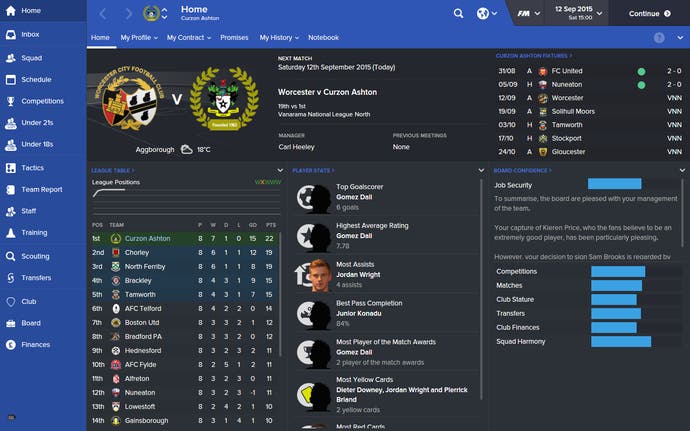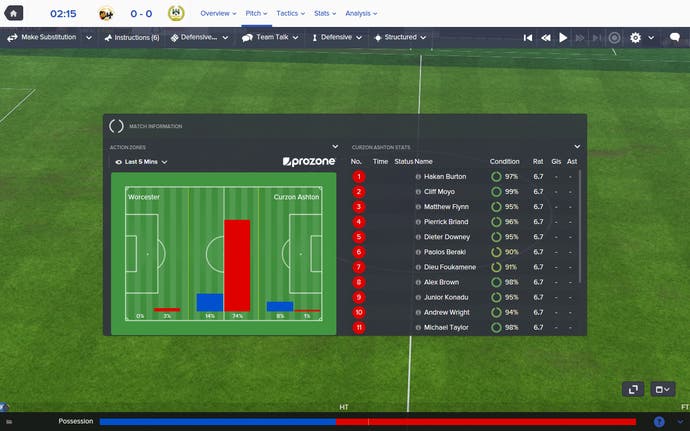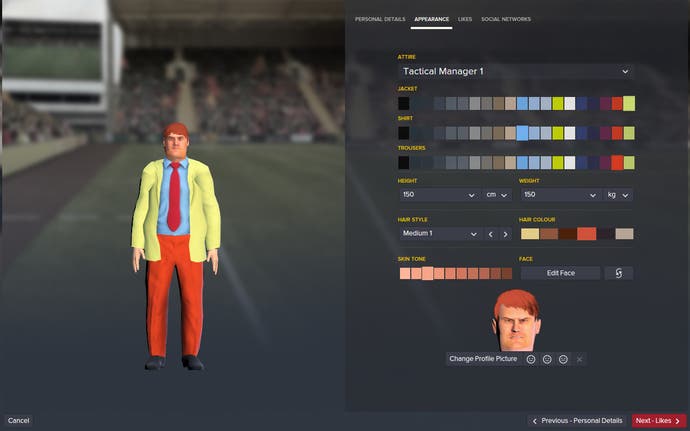Football Manager 2016 review
Playing it safe.
If you follow any of Football Manager's various presences on social media, there's a recurring joke you'll have become familiar with. When something really bizarre happens in the real world of football, followers will inform the account, annotating their tweets with a single word: BUG!
Chelsea 13 places below Leicester in the table? BUG! Lewandowski scoring five goals in nine minutes? BUG! Liverpool players suffer season-ending ACL injuries on consecutive days... You get the idea.
The inference is clear: Football Manager's match engine might be capricious, infuriating, cruel and, at times, maddeningly unfair. But so it should be. That's football.
The difference, of course, is that more often than not these real-life oddities can be explained and understood. One of the biggest problems with Football Manager in recent years is that, when fortunes turn against you, there's no chance to learn, to develop as a manager, and to prevent the same things happening again.
An example from Football Manager 15. Of the 232 hours (gulp) I spent attempting to guide Weston-Super-Mare to the Premier League, the most painful by far were those spent across six encounters with Shrewsbury (two in the playoffs) over two seasons in League Two.

Shrewsbury played with an absurdly lopsided 4-0-6 formation. Two wingers, two strikers, two attacking midfielders. If ever there was an unbalanced tactic that a seasoned FM manager (ahem) such as myself should be able to exploit, this was it.
But I lost. Every time. And how! 4-0, 3-0, 5-0. In one match I tried to slow things down and flood the midfield, in another I tried to sit back and counter. I even sought advice from a community forum, which suggested I mirrored their formation. That didn't work either. Turned over again and again, it was the closest I came all year to giving up the game. No man should have nightmares about an 8mm Scott Vernon.
I was intrigued, then, to hear that one of FM16's key new features was the incorporation of Prozone analysis - allowing, one would hope, the chance to gain a deeper understanding of where your team might be going wrong (or right). Sports Interactive has a partnership with the analytics firm and the chance to use the same tools as Messrs Wenger and, er, McClaren, or even a rough facsimile of them, sounded hugely appealing.
Sadly, the result is something of a mixed bag. The use of branding is slick and - superficially - impressive, though the menus themselves aren't at all easy to use. The sheer amount of data available at the end of every match is simply vast, to the point where it's almost overwhelming. But, on a basic level, I have found it helpful. If you're consistently giving away chances in one area of the pitch, perhaps there's a gap in your formation. If one player keeps giving the ball away, maybe he's not got enough teammates around him to pass to - or perhaps he needs to be dropped.

Anything beyond that, though, and, once again, I'm stumped. It won't tell you whether you've lost because you were closing down too much, or too little. Or because your defensive line was too high, or too low. Would Prozone analysis have helped me tame those pesky Shrews? Not without a hireable in-game performance analyst. This is no panacea for those, like me, who crave some FM feedback.
Thankfully the match engine itself is in pretty robust shape, and you can tell that a year's worth of work has gone in to finessing Football Manager 15's somewhat flawed release code. All but gone are the crazy scorelines, and you'll encounter much more variety in the AI's tactics. While some old problems remain with animations - a player standing and watching as a pass trickles past him, for example - they're hardly game-breaking, and the long-awaited new injury system doesn't seem to have thrown anything out of balance.
Players will now communicate with you during the game, asking to come off if they're struggling and letting you know that they've, say, strained their thigh. It's a noteworthy improvement to an area that's barely changed this century and - alongside a more realistic transfer market - represents one of the few ways in which Football Manager 16 represents an unequivocal upgrade on its predecessor.
I wasn't a fan of last year's changes to Football Manager's interface, and though it has been honed aesthetically - particularly the in-game setup, which is more functional and streamlined than ever - it still seems that too often the information you'd expect to be on a certain screen isn't there, or that rows and columns reorder themselves as if they have a mind of their own. Meanwhile, what was billed as an overhaul to the Tactics screen is nothing more than graphical overlay of the same options - one that's much fiddlier to use and feels like change for change's sake.
The new set pieces system, now similarly graphical rather than text-based, offers you the chance to vary your routines for the first time, which is a decent feature, but again it feels like usability has been sacrificed just in order to look a bit different. The revamped Staff and Finances summaries are also disappointing, and seem like little more than exercises in space-filling. I've yet to understand why I'd want a bar graph telling me how my physiotherapy team compared to others in the league.

Football Manager 16's other headline features, if we can call them that, don't really warrant a great deal of discussion. I was uncomfortable enough giving myself coaching stats for the first time last year - in my mind levelling up a fictional Jack Arnott character just isn't what Football Manager is about - and the customisable 3D avatar that now stands on the touchline during matches feels even stranger. The creation suite is so basic that you're lucky if the end result looks human, let alone bears any resemblance to you, and this miniscule monstrosity with plastic hair and a neon tracksuit then stalks the touchline your entire career, never ageing, never changing clothes or hairstyles, never wearing club colours. I'm sure, to some extent, it was meant to be funny, but it's an odd move for a series that always seems to have taken itself so seriously.
There are new media interactions, which means you'll have a greater variety of text to skim through as you click the second answer down to every question for fear of upsetting your squad. Meanwhile, Create a Club mode is little more than a new way of interacting with the data editor, and will be of limited interest to hardcore fans of the full-fat sim version of the game. Fantasy Draft is a more valuable addition - it's fun levelling the playing field and competing with your friends with scratch teams. But at the same time there's something that feels a bit thrown together about the whole enterprise - it could do with another year of tinkering.
Slimmed-down Football Manager, previously known as Football Manager Classic, is now Football Manager Touch, a rebrand to reflect a new cross-save function across devices (and, presumably, a new focus on the tablet gaming market). Little else has changed. As ever, the pared down Football Manager experience offers a much less demanding way of interacting with the match engine, though in a way which I feel runs contrary to the principles of the series - it makes sense, then, that Touch will be sold as a standalone release for the first time this winter.
So we have a few Prozone logos added to the menus. A handful of marketable but fairly shallow new features that will probably be forgotten come Football Manager 17. And a tighter engine that feels, if not fairer, then less erratic. While the last part means Football Manager 16 is almost certainly once more worth a few hundred hours of your time, it's hard to recommend an iterative release that is so clearly lacking in new ideas.
